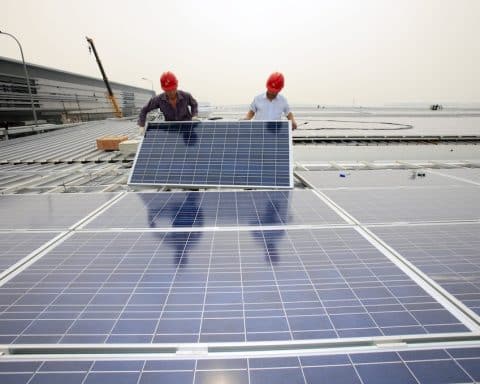Under fredagen besökte president Xi Jinping partitidningen Folkets dagblad, statliga tv-nätverket CCTV och Kinas officiella nyhetsbyrå Xinhua.
Besöken vid de tre redaktionerna avslutades med ett symposium under eftermiddagen där Xi talade om vikten av att följa kommunistpartiets ledarskap och fokusera på ”positiv rapportering”.
Nyhetsbyrån Xinhua rapporterar från symposiet:
All news media run by the Party must work to speak for the Party’s will and its propositions and protect the Party’s authority and unity, Xi said.
They should enhance their awareness to align their ideology, political thinking and deeds to those of the CPC Central Committee and help fashion the Party’s theories and policies into conscious action by the general public while providing spiritual enrichment to the people, he said.
Marxist journalistic education must be promoted among journalists, Xi added, to make them ”disseminators of the Party’s policies and propositions, recorders of the time, promoters of social advancement and watchers of equality and justice.”
According to Xi, the mission of the Party’s media work is to provide guidance for the public, serve the country’s overall interests, unite the general public, instill confidence and pool strength, tell right from wrong and connect China to the world.
(…)
Calling for innovative concepts, content and methods, Xi told media groups to make use of new media’s edge in publicity, amplify their voices on the international stage, tell stories about China well and build flagship media groups with strong global influence.
According to Xi, the journalism industry should accelerate its progress in fostering workers with firm political beliefs, outstanding professional skills, moral excellence and whom the Party and people can trust.
Bland annat The Guardian poängterar att presidentbesök av denna sort vid landets medier är något mycket ovanligt, och utgör ytterligare ett bevis på kommunistpartiets ökande kontrollbehov över nyhetsförmedlingen.
Vidare så är besöket också ett tecken på Xi Jinpings ambition att stärka sin maktposition inom partiet. En kinesisk politisk analytiker som The Guardian talar med menar att detta är en metod av Xi att cementera sitt personliga inflytande över nyheterna och att personkulten kring presidenten kan komma att öka inom statlig media.
En professor från Hongkong pekar på hur besöket ökar kravet på statlig media att följa de politiska direktiven från kommunistpartiets ledarskap, som i allt högre utsträckning utformas av Xi Jinping personligen.
The Guardian poängterar också den skylt som mötte Xi Jinping vid CCTV:s redaktion, med en text om att tv-nätverket är så lojalt att det ”heter [kommunist]partiet i efternamn” och välkomnar all inspektion:
"CCTV's family is The Party; Absolute loyalty; Please inspect us" – blare screens during Xi visit. @S_Rabinovitch pic.twitter.com/DGe2K2tcoU
— Tom Grundy (@tomgrundy) February 19, 2016
Även David Bandurski på China Media Project pekar ut hur Xi Jinpings går mycket längre än sina föregångare Hu Jintao och Jiang Zemin för att sätta press på media och kontrollera dess innehåll.
Medan Hu Jintaos tillvägagångssätt präglades av ”strategi och urval”, så går Xi Jinping fram utan några som helst hämningar. China Media Project översätter även Folkets dagblads framsida från lördagen 20 februari, dagen efter Xi Jinpings besök:
The front-page piece in the February 20 edition of the People’s Daily is an in-depth treatment of Xi Jinping’s “important speech” on the role of media. Further details may come over the next few weeks. But for now, we can summarise the various media policies of the past three leadership generations in the following way:
The Party’s news and public opinion work must adhere to the principle of the Party character, cleaving fundamentally to the Party’s leadership of news and public opinion work. Media run by the Party and government are propaganda positions of the Party and the government, and they must reflect the Party (必须姓党) [lit., “be surnamed Party”]. All work of the Party’s news and public opinion media must reflect (体现) the will of the Party, mirror (反映) the views of the Party, preserve the authority of the Party, preserve the unity of the Party, and achieve love of the Party, protection of the Party and acting for the Party (爱党、护党、为党); they must all increase their consciousness of falling in line, maintaining a high level of uniformity (高度一致) with the Party in ideology, politics and action.

För att ytterligare stärka sitt informationsmonopol presenterade Kinas myndigheter förra veckan även en ny lag som förbjuder all publicering online från utländska aktörer. Bland annat Quartz skriver om denna nya drakoniska regel:
In the latest sign that China’s long-touted “opening up” is reversing into a “closing down,” a Chinese ministry has issued new rules that ban any foreign-invested company from publishing anything online in China, effective next month.
The Ministry of Industry and Information Technology’s new rules (link in Chinese) could, if they were enforced as written, essentially shut down China as a market for foreign news outlets, publishers, gaming companies, information providers, and entertainment companies starting on March 10. Issued in conjunction with the State Administration of Press, Publication, Radio, Film and Television (SARFT), they set strict new guidelines for what can be published online, and how that publisher should conduct business in China.
Lagen har alltså potential att driva ut otaliga utländska företag från Kina; inte bara inom media utan även underhållningsindustrin. Det är dock oklart vad lagen innebära praktiken.
Att plötsligt hindra all utländsk publicering på Kinas internet vore väl helt omöjligt. Eller?
InBeijing kommer följa upp denna lag efter att den träder i kraft 10 mars.





